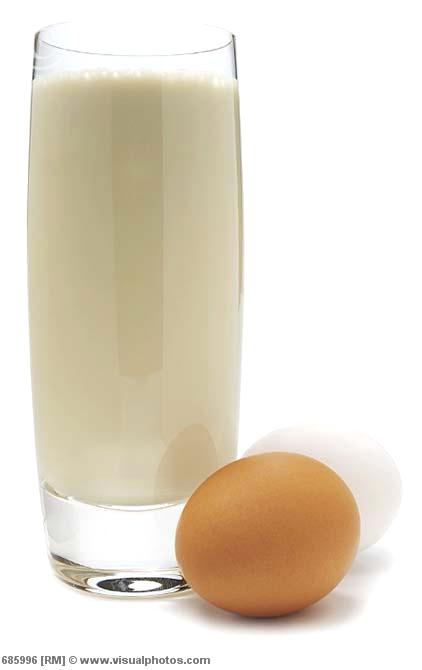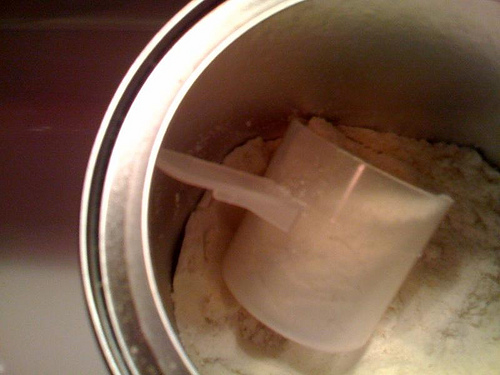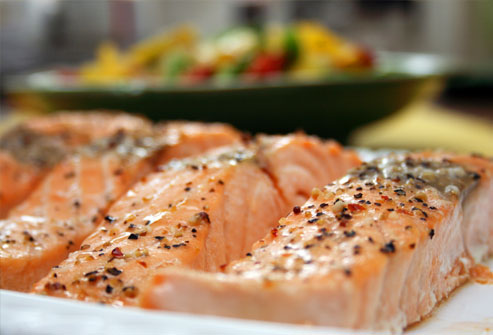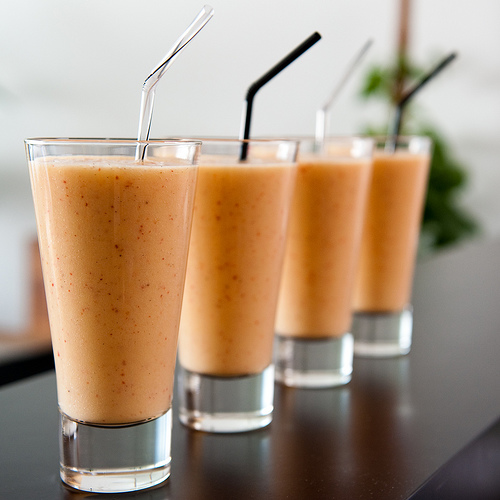
All About Protein
Protein is our mainstay during the weight-loss phase, so it's important to know all about it.
How do we know which one is the best? What do we look for? How much do we absorb? There are a lot of protein powders to learn about but there is more to protein than just powder.
I've done your homework for you...so here is the whole scoop on protein powders as well as whole food protein.
You will find recipes, shakes, and other protein information in various sections.
which whey? (how to choose protein supplements)
 The first and foremost important ingredient in our pre and post op food plan as weight loss surgery patients is protein.
The first and foremost important ingredient in our pre and post op food plan as weight loss surgery patients is protein.
Protein offers a plethora of important benefits, but simply stated, protein is what helps us lose fat without losing muscle mass.
There are so many protein supplement options on the market today and the list just keeps growing and growing...options are a very good thing...but with so many options how are we suppose to choose which one is the best?
Here are some tips on understanding which whey is the right whey for you!
First, lets talk about cost. It may seem that protein supplements are expensive, mostly because you're buying them in bulk. Remember your health is your priority. Consider the servings per container and remember protein shakes and powders are your meals for quite a while, your not eating a lot of "real" food. Protein shakes are essential for health during this weight loss phase, you'll phase them out after you're on maintenance. Not all proteins are created equal...start with high quality protein that you enjoy and then you can look around for other products you like.
Reading Labels...What to look for
Start by reading the labels...
Label reading can be confusing, but not when you know what to look for...
The top five things to consider are all listed on the nutritional label.
- calories
- fat
- sugar
- carbs
- protein
- Check ingredients and grams. First look for high quality protein. It should be listed first on the ingredient label. The protein content should be as high as possible. Protein supplements should offer a complete source of protein (more on this later). So of first importance is the protein content.
- Twenty grams per scoop is considered high.
- After checking protein check the label for: low carbs, low sugar, and low fat with the least calories as possible. (see below). Usually if the carbohydrates and fat are low the calories will be also.
- High quality protein is imperative, not the lest expensive. I once heard that choosing a protein supplement is like choosing a car seat for your infant...would you go for cheapest of safest? (look for an upcoming post of complete protein)
- Whey protein isolate or hydrolyzed whey is best, but whey concentrate will do in a pinch. *These proteins digest very quickly and are the ones chosen for pre and post workouts or exercise. Casein or milk protein isolate will digest much slower. These proteins are great for mid-meal snacks, meal-replacements or pre-bedtime shakes. Other drinks may contain protein blends, including egg protein, soy and/or added amino acids such as branch chain aminos or L-glutamine.
*Do not take this to mean that you need a different protein for each activitiy as a bariatric patient, this is to help you understand the benefits and differences between protein types.
Taste
Select a protein drink that taste good. You will be on protein supplements during your weight loss phase. It's important to find a protein drink that you enjoy. Don't expect it to taste like the best milkshake you've ever had, but can you tolerate it? What flavors do you like best? You might prefer to find one you can add your own flavor to and get creative. Find several that you like and try not to get burned out on just one flavor or product brand. I chose one staple brand that I liked with high quality medical protein and made shakes of different flavors. Then I had more than a dozen that I liked, both powder an pre-made, ready to use varieties.
Fats
Check the fat content. Contrary to popular belief, zero-fat products are not necessarily the best. Fat limits should be around 5 grams per serving (or single digits). Some fats are healthy, such as CLA, or conjugated linoleic acid, sesame see oil and medium-chain triglycerides (saturated fat from coconuts) help to fill you up, stabilize blood sugar and burn body fat. Avoid other high saturated fats.
Sugar
Check the sugar content. Many protein drinks are sweetened with the artificial sugar substitute sucralose, also known as Splenda. Anything over 10 grams of sugar per serving is considered high. Keeping the sugar as low as possible will ensure that you don't have dumping. Lactose free proteins are available. Lactose is milk sugar.
Fiber
Pick a product with some dietary fiber. Enlightened protein drink manufacturers recognize the link between fiber intake and reducing the risk of heart disease and obesity. Several products offer 5 or 6g of dietary fiber per serving, which can also help to suppress hunger between whole-food meals. If the product you select doesn't have fiber you can add your own by adding wheat germ. It's better to select a good product that meets the fat, sugar, carb and protein criteria and add your own fiber.
Where to find protein supplements
Protein supplements are everywhere from health food stores, vitamin store, grocery and specially stores, the internet and many bariatric sites.
It's a good idea to start by researching on the internet. Some places offer samples. Once you found one you like, high quality protein that fits the nutritional requirements and taste you prefer, then shop for price comparison.
My staple protein was Unjury Medical Quality Protein, however, I had dozens of other brands I enjoyed. I am always on the lookout for new products. Unjury is sold in large containers and also smaller packets which made easier travel. Although I never really did a lot of the high protein "shots" or "viles", they are good for traveling, especially when traveling by air. I always made sure that when traveling that there was at least one variety of protein that I could find at a local grocery store. I did this by researching different brands and knowing my homework ahead of time, not to get caught without.
I did a lot of research to find several proteins I liked and it paid off in the end. I actually enjoyed those protein shakes! Choosing proteins are essential for good health and weight loss...so enjoy the journey, get creative and most importantly, know your protein! Look for other protein favorites and information in this section.
Yes, we can, we have many more miles to go!
whey to prepare
There is a lot of talk these days about protein, quality, purity and how much protein is enough or too much. Some experts say we can only absorb about 9 grams per hour. As far as I can tell, no real studies have been found to indicate how much protein our bodies can absorb.
Remember also that weight loss surgery patients have certain health needs that "normal" folks don't have. Our bodies absorb differently after gastric bypass surgery. Keep in mind that although we don't have conclusive research on absorption, it's important to get enough protein during the healing and weight loss phases, which is usually considered approximately two years, or until a regular solid, real food diet is resumed. Protein supplements are not forever, even for gastric bypass patients.
Your surgeon will do blood work to determine your protein levels and adjust your intake. It is important during the years following gastric bypass to stay in close contact with your health care professionals. Protein supplements after weight loss surgery should be considered "medically" important and care should be taken to insure you are receiving not only "medical" quality supplements but also sufficient protein for your needs during this time.
Preparing for the increase in your body's protein level is also important. During this preparation time, find several kinds of protein that you can tolerate before surgery. Starting with the clear liquids and experimenting with various flavors, shakes, powders, smoothies and bar supplements.
Health and Safety
The Mayo Clinic notes that a sudden increase in protein intake can be dangerous for adults who suffer from kidney or liver disease. Excess protein can wreak havoc on a system that cannot filter the byproduct waste once the protein is burned by the metabolism. This information was targeted mostly for people who consume protein as meal replacement and diet purposes.
Even so, as a weight loss surgery patient, if you are compliant with the guidelines given, under a doctor's care and consulting a dietitian, your concern is most likely on the side of getting enough protein, rather than too much.
When planning on increasing your protein intake it is best to do so gradually so that your body is used to breaking down the excess protein. This time of preparation before surgery also gives your taste buds time to adjust. Like anything else, the more you drink it, the more you'll like it. With so many options of protein now on the market you're sure to find one that is right for you.
So follow your guidelines on protein and start preparing before surgery. Find several proteins that you like, so you won't get tired of just one kind, and gradually increase your intake until surgery time...
Yes, you can...you have many more miles to go!
protein and heavy metals article
 This article reprinted from the Los Angeles Times June 1, 2010
This article reprinted from the Los Angeles Times June 1, 2010
"The online site released a report Tuesday in which outside lab tests were run on 15 different protein drinks (ready-to-drink liquids and powder mixes) and found that some contained contaminants such as cadmium, arsenic, lead and mercury — most in the low to moderate range. But the authors of the investigation point out that levels were high enough in three of the supplements that if three servings were consumed daily, levels could surpass the maximum recommended limits for one or two of the contaminants.
The report found that three daily servings of EAS Myoplex Original Rich Dark Chocolate Shake have an average 16.9 micrograms of arsenic, which is over the suggested U.S. Pharmacopeia limit of 15 micrograms per day. Three servings also contain an average of 5.1 micrograms of cadmium, just over the USP limit of 5 micrograms. Three daily servings of some types of Muscle Milk products also exceeded suggested limits for certain heavy metals. The report points out that shellfish and some organ meats, such as liver, can be high in cadmium, as can plants that absorb phosphate fertilizers. According to the Food and Drug Administration, milk, yogurt, eggs, red meat and poultry can be good sources of heavy metal-free protein.
Consuming too much protein, which can be done if some supplements are overused, can lead to health problems, according to Consumer Reports. Most women need about 46 grams of protein per day and most men need about 56 grams, according to the Centers for Disease Control and Prevention.
The report will also be available in the July issue of the magazine Consumer Reports."
— Jeannine Stein
Article reprinted from Los Angeles Times, June 1, 2010
 UPDATE: Greg Pickett, founder of Cytosport, Inc., which makes the Muscle Milk products cited for heavy metal contaminants, disputes Consumer Reports' findings.
UPDATE: Greg Pickett, founder of Cytosport, Inc., which makes the Muscle Milk products cited for heavy metal contaminants, disputes Consumer Reports' findings.
In a statement he sent us, Pickett says that his products clear independent testing standards and "do not reflect the concentrations" in the Consumer Reports article.
Pickett also notes that these metals occur in nature. "It would be uncommon, if not impossible, not to detect the trace amounts reportedly found in any agricultural product, such as dairy products, fruits and vegetables," he said.
liquid protein...forever?
 Liquid protein powders and supplements... forever?
Liquid protein powders and supplements... forever?
Are you kidding me?
Ahhhh! Just kidding...
Well, sometimes we are lead to believe that protein supplements will be forever, but come a little closer and I'll tell you a secret...it's not forever...the liquids and powder protein supplements that is...not the protein itself...
Your ultimate goal is to be able to eat real food protein again.
Real solid food. That would be hamburger, chicken, fish, you know something you can sink your teeth into...not mix in a blender....
For the first two years after weight loss surgery, your tummy will grow...this is due to the healing process of the tummy and it is a "stretchy" organ...it was made to stretch...and it will. You can protect the size of your pouch by following the guidelines, in other words, don't help it out by overeating. But the point is, you will be able to eat more solid food after the initial weight loss phase is done.
Two points are important about this first weight loss phase...
During the weight lose phase it is imperative that you get in that protein supplement...first and foremost.
Protein is for healing and maintaining muscle mass, losing weight and some other stuff, more about this in a minute.
Liquid proteins keep you healthy and healing and losing during this weight loss phase. This is your easiest and best opportunity to learn the ropes and change your lifestyle. So make the most of it...it will be over before you know it...and besides your brain has to have time to catch up with your body...believe me...
This adjustment time is important. If you didn't have time to adjust, it would be like someone just handing you a brand new baby unannounced...for keeps...and then walking away. Can you imagine the shock when you realize you're not only physically not prepared but emotional as well...wait, come back...where are the instructions...aaaaa...and...the diapers! ...and wipes! What do I do when it cries? Let's see I'll need a car seat and a crib. Oh, and clothes. What size? And milk. What kind? And bottles...help! I'm not ready for this. When will it sleep? Or better yet, when will I sleep? Well, you get the point.
Make the most of the weight loss phase window of opportunity. Be diligent with learning all you can about how your brand new baby pouch operates and what your body needs to be at optimum health and emotional wholeness.
During this phase, (the first 6 to 12 months) your opportunity for weight loss is at it's prime. The weight just seems to fall off and your hunger is subdued.
That does not mean that weight loss is impossible after this period of "prime opportunity", but taking care of your new tool pouch and practicing new lifestyle changes are paramount. Lifestyle changes are forever if weight loss is to be successful.
Which brings me to my second point, lifestyle changes are what is going to make or break the weight loss success. This period of the first two years is the time you want to practice the dietary guidelines and exercise and activity lifestyle changes. Your ability to make these changes will insure that you keep the weight off.
After this weight loss phase, your surgeon or dietician will release you from protein liquid and powder supplements and you will return to eating real food protein. When, how much, and what that will look like is personal, individual and will be decided by your health care professionals.
As each month passes and weight loss and lifestyle changes are diligent, you are closer and closer to the new body you have dreamed of. My advise, from experience...stay with the plan, work the plan with all diligence, and at all cost; don't vary from the plan, and prepare physically and mentally for your new lifestyle, protect that pouch, get into an exercise routine, learn the ropes and soon life will be as close to normal as it gets for a weight loss surgery patient.
the window of opportunity:
There are certain factors that make the first year opportune for weight loss:
- The more we weigh the faster we lose because we burn more calories.
- Our motivation level is at it's highest in the beginning months after surgery and
- our hunger level is lower.
You can learn more about this by searching "window of opportunity" on the search bar on the left.
protein power:
Our objective is to lose weight, but we want to lose fat, not lean muscle mass. In the process of eating less food our metabolic rate changes. To combat the loss of muscle mass and the subsequent dip in metabolic rate a high protein diet coupled with moderate weight training can help you to preserve your muscle mass when in a caloric deficit.
If you’ve ever heard somebody say that a calorie is a calorie, they’re flat out wrong. Consuming a high protein diet increases the thermic effect of eating. The thermic effect of eating is the amount of energy required to digest and absorb the food that you eat. Digesting protein required a lot more energy than digesting carbohydrates. In fact the thermic effect of protein is a whopping 30% whereas for carbs it’s only around 7-8%. That means that 30 % of the calories of protein consumed needs to be burned off in order to digest it. Clearly, this leads to a higher metabolic rate and greater fat loss when dieting.
So drink those protein shakes like it was your saving grace...they are! Protein shakes are your key to healthy weight loss. After your weight loss phase, protein food will be your priority. Eating enough solid food protein will be the key to maintaining health and weight loss success. Keeping that tummy full with solid food including solid food, real food protein is also the key to satiety.
Protein is for the long haul...it is vital to maintaining muscle mass, metabolic rate and keeping blood sugars stable, good health and permanent weight loss...So stick tight to those protein shakes, it's temporary, in the long term you'll be so glad you made the effort, it will pay back benefits that long last the struggle of getting down those protein supplements....and I'm not kidding!
protein first

There are some things in life that just don't change. One of them for a gastric bypass patient is: protein. Protein is important for a lot of reasons, but the one that I am finding out about most in this season of my weight loss journey is just how important it is, I'm going back to: protein first.
In the beginning years, I always without exception did protein first. Then along the way, after about 2 years or so, several people who were suppose to be knowledgeable in this area said...forget that rule, veggies are just as important. Well, veggies are important and you should eat them, without question. But if you are a gastric bypass patient, the first and foremost food item that should leave your plate and into your little tummy is: protein.
Now, I'm all for balance, and I'm also for no "hard fast rules", (by that I mean, sometimes when you don't bend you break), there are in some cases, in some matters, occasional exceptions to the rule, however, when it comes to gastric bypass patients and protein...this is one that must stay the course. This one is the absolute.
It wasn't that I didn't eat my protein, or that I didn't measure my protein, it's not that I didn't eat enough protein, but I didn't eat it first. I found this out the hard way, after year three, you know if you've been reading...hypoglycemia hit, and hit hard. In my case, my hypoglycemia has been a little harder to control than most but, I have made one significant discovery. Protein must be first.
I have also discovered, not only do I have less "crashes" in my blood sugar when I eat my protein first, but when I don't get enough protein, I crash as well. So this short lesson, get enough protein and: protein first.
How much protein you eat will depend on your surgeon or dietitian guidelines, as well as your "food phase" and time out from surgery, on regular diet phases, the amount is usually 2 to 3 ounces. If you have other issues such as hypoglycemia, you may have to find the sweet spot that works for you. It may also depend on the other foods you eat with your meal, and what the source of protein is that you're eating.
Either way, eat your fruits and veggies...but remember protein first...yes we can, we have many more meals to go!

